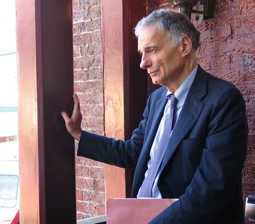
Unlike his peers, Ralph Nader doesn’t kowtow to corporations and special interest groups. In fact, he shuns them. He is more concerned with democracy and empowerment for us than with his own legacy. He has insurmountable amounts of passion and concern for the environment and for the American consumer, and has a proven track record of progressive change. And Iraq, he thinks it was a pretty bad idea. In short, he’s what many say our country needs.
So why is Ralph Nader so unelectable? Do we not vote for independent candidates out of fear or out of choice?
With the Democratic Party’s grudge against Ralph Nader still firmly in place after an alleged slim defeat in Florida in 2000 (speculation continues to surround the 2000 Presidential election), America’s die hard freedom fighter is back for another round.
Ralph Nader asks the same questions as the rest of us, but with one notable exception. He questions corporate authority in the most public of forums and then has the audacity to expect answers. It’s a dangerous habit which has relegated him to the political sidelines for years. No matter to Nader, whose ambitions are not climbing the political landscape and accumulating power. His interests actually lie in the areas of truth, justice and liberty for all. How’s that for old school?
Ralph Nader even incites mixed emotions from the American public, whom he has fought so hard to protect since first setting foot in Washington in 1964. In past decades, the electoral process was not even on Ralph Nader’s radar. The Harvard Law graduate and former professor had his sites set on social policy reform where he successfully lobbied congress for cleaner air, cleaner water, safer transportation and more access to government information for all United States citizens. For the unaware and even for the ultra-conservative, much of our current-day quality of life has Ralph Nader’s stamp on it.
In many ways Ralph Nader represents the establishment’s worst nightmare, an Ivy League educated rebel and a formidable opponent of corporate run government. He is armed with the intellectual tools to uncover and expose every bit of corruption and injustice that lies in his wake. No wonder he’s the unpopular kid up on Capitol Hill.
PR.com (Allison Kugel): You’ve just announced your candidacy for the 2008 Presidential election. Coming from a legal background and then consumer activism, what prompts you to want to enter the political arena, especially since you seem to have so much disdain for it?
Ralph Nader: Because the corporate government has shut the doors down on us in Washington. We can’t get congressional hearings on our subjects that we used to. We can’t get the regulatory agencies to respond to our petitions, like [The] Food and Drug Administration and OSHA (Occupational Safety & Health Administration) and Auto Safety. So, we either close down and go to Monterey and watch the whales, or we go into the electoral arena.
PR.com: What do these agencies respond to, if they’re not responding to you?
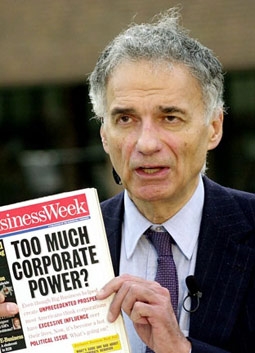
Ralph Nader: The doors are open for corporations: thirty-five thousand daily lobbyists, ten thousand political action committees (PACs) and slush funds and their own executives in high agency government positions; like The Defense Treasury and the FDA. So, the corporations are now our government. It’s not that they just have influence. They are our government.
PR.com: Yet in your activism and lobbying to congress you were able to accomplish so much. I don’t know if a lot of people know that your lobbying in Washington led to Congress passing everything from National Traffic and Motor Vehicle Safety Act to The Freedom of Information Act to The Clean Air Act.
Ralph Nader: You can’t do it anymore. It was all done in the sixties and seventies, and a little bit in the eighties. The nineties, under [Bill] Clinton, almost impossible. Under [George W.] Bush, almost impossible.
PR.com: What was the process back then that allowed you to do that?
Ralph Nader: We’d go to Chairs of committees in the Senate and the House. We’d persuade them on the merits to hold investigative hearings and propose legislation, and they would pass them. Lyndon Johnson, and even Nixon and Carter, would sign them and then the agencies would be created or strengthened, like The Auto Safety Agency and Product Safety Commissions. And they were supposed to implement it. But it’s all closed down now. Most of these groups don’t want to admit it, because they want to make it appear that they’re able to do something, but they know that they can’t do much at all. It’s because the two parties are dialing for the same dollars. They socialize with the same lobbyists. There was an article recently in Politico which says that the lobbyists who gave to Republicans are now moving over to give to Democrats.
PR.com: But how can a candidate raise money without taking corporate dollars? You, yourself, were in a position where in the year 2000 you got 3% of the popular vote which is incredible considering you didn’t have financial resources to speak of, but how are you supposed to have longevity in a political race if you don’t take corporate money?
Ralph Nader: Well, you raise it in small denominations from a lot of people. With the Internet, that helps you do that. You become very frugal. So, you raise ten bucks, you get fifty dollars out of it, compared to your major candidates. And you talk about issues that generate news, although that’s not up to you. That’s up to the media. And you do creative things. We’re going to start now with demonstrations in front of government departments showing what corporate government is all about. Tomorrow the first demonstration will be before the NHTSA Auto Safety Agency. It’s about to issue a very weak roof crush standard that is exceeded already by cars like Volvo and Saab. So, we’re going to go from one department to another and invite the press to demonstrate what we mean when we say “corporate government”; in terms of people’s everyday health and safety well being.
PR.com: In 2000 when you ran for President against Al Gore and George W. Bush you were under The Green Party. Are you still involved with the Green Party?
Ralph Nader: No. Matt Gonzalez and I, the Nader/Gonzalaz ticket, is an Independent run.
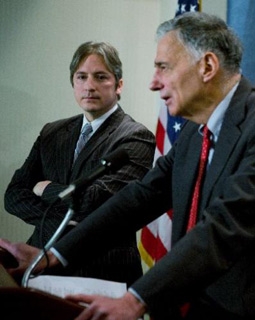
PR.com: From my memory, you were the first person to talk about the peril that our environment is in, in a public forum. Eight years ago everybody dismissed the Green Party as kind of frivolous. Nobody really paid attention. Then all of a sudden a few years later Al Gore came out with this big environmental campaign. But, from what I remember, you were the first guy to talk about these issues.
Ralph Nader: But, you see it doesn’t matter. We have far more information now in this country. The issue is whether we have the political freedom and the political access in the electoral process to get on the ballot and to have the media respect diverse views, especially when they are based on a record of past accomplishment… and to be able to get on the debates. The Commission on Presidential Debates (CPD) is a farce. It’s a private corporation created by the Republican/Democratic Party in 1987 to get rid of The League of Women Voters presiding over the debates. They decide who gets on the debate. And guess what? They don’t like competition. And, they get it funded by Anheuser Bush, Ford Motor Company, Philip Morris (laughs)… people from Western Europe and Canada can’t believe how we have partisan state governments re-district in favor of their party. In Western Europe it’s non-partisan commission who do that. All of the national polls wanted me on the debates with the Republican/Democrat in 2000 and in 2004. So, it isn’t like people don’t like debates with more than two people.
PR.com: Is this something that you’re going to be completely shut out of this year?
Ralph Nader: Yeah. You can’t sue them because they’re not government. You can’t say, “They’re violating my constitutional rights,” because they’re not a government agency. They’re a private corporation. As long as they get the complete cooperation with the TV networks, it’s a lock.
PR.com: You’ve called Hillary Clinton a “corporate Democrat.” Why is Barack Obama not a corporate Democrat?
Ralph Nader: He is a corporate Democrat. And McCain is a corporate Republican. The central issue in politics is power, concentration of power. Who has too much, who has too little, who should have more and who should have less. And, in our country, in our generation, there isn’t anything they touch that they don’t try to control, including commercializing childhood.
PR.com: When you recently announced that you were running in the 2008 Presidential election, did you get phone calls from Hillary Clinton’s camp or from Barack Obama’s camp asking you not to?
Ralph Nader: No, they just said it’s unfortunate that I was running, when the press asked them. She said, “It’s not helpful.” And, he was caught unawares because it sort of put him at edge, because I’ve been trying to meet with him for six months and he would never meet at his Senate office (laughs). He doesn’t want to know what I have to say. And, he sort of paused when the reporter asked him and he said, “Well, Ralph Nader’s done a lot of good, but if you don’t agree with him one hundred percent he says you’re a tool of special interests.”
PR.com: Is that true? Are you kind of black and white in that respect?
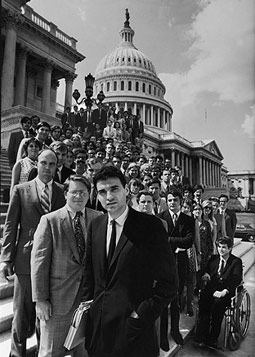
Ralph Nader: No, no, not at all. It’s just that I expect them to be at least fifty percent (laughs), because the corporations force you to compromise.
PR.com: As part of your current campaign for President, on your website (www.votenader.org) you state a list of very important issues that you say are quote un quote “on the table” for discussion for your campaign, and which you claim are “off the table” with Hillary Clinton and Barack Obama. I just want to go over a couple of those with you. First, you talk about single payer national health insurance. Why health insurance at all? Why not socialized government funded healthcare?
Ralph Nader: Well, that’s what it is. It’s government insurance; and private delivery of medical and hospital services with free choice for the patient of hospital and doctor; just like they have in Canada. They cover everybody for 11% of their GDP. We’re at 16%. We leave out 50 million people. And others are under-covered. Co-payments, deductions, exclusions, pre-existing conditions… it’s a nightmare of waste, corruption, inefficiency.
PR.com: Do you think Hillary Clinton or Barack Obama are even close to the mark when it comes to healthcare reform?
Ralph Nader: No, because you’ve got to replace the insurance industry. That’s what Medicare did in 1964 for elderly people, single payer. Now they have gaps and all, and they started putting loopholes, but the original idea is they put them out of business except for Medigap, which started later. You can’t have efficiency, you can’t have billing accuracy. That’s five hundred billion dollars right there.
PR.com: Let’s move on to another issue you talk about which is exchanging fossil fuels to alternative solar energy and other alternative energies. How can this happen? The oil companies are not just going to lie down and surrender. How can this happen with their lobbyists in Washington?
Ralph Nader: By rousing the people. The people have the power but they’ve got to recognize it, build it up, focus and zero in on Congress and The White House. Nixon signed all these great bills that we passed in Congress. He never believed in any of them, but he was afraid. He was afraid of the rumble of the people coming out of the sixties. We’ve got to re-introduce the rumble of the people.
PR.com: And you mention reversing United States policy in the Middle East. What would you reverse it to?
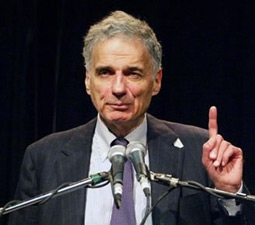
Ralph Nader: Support the peace movements in Israel and in Palestine for a two state solution. The majority of the people there want a two state solution. Instead our government is supporting the hard liner in Israel, to occupy and dominate and harm people in the West Bank and the Gaza [Strip]. Iraq, six months deadline, withdrawal of U.S. soldiers and oil companies. Give them back their country. Negotiate a withdrawal getting the three groups together: Sunni, Shiites and Shiite Kurds… they worked it out in the fifties. They know how to do it. You confront them with that. You say, “Look, we’re gonna give you back your country and your oil. The alternative is total chaos. Get together. We’ll help with the humanitarian aide, and continue the humanitarian aide and we think you need the UN sponsored free elections, which you haven’t had.” That’s what will knock the bottom out of the insurgencies. As long as we’re there, there’ll be an insurgency, there will be struggles, revenge, all that. As long as we’re there, their oil will be looted. As long as we’re there we will produce more terrorists from other countries, as well as from Iraq. All of this, by the way, has been said by some of Bush’s own people. General Casey said that our military presence in [Iraq] is a recruiting ground for more and more terrorists.
PR.com: And, one hot button issue that you also mention is impeaching Bush and Cheney.
Ralph Nader: That’s simple, applying the constitutional responsibilities of the Congress. This is the most impeachable Presidency in American history.
PR.com: Do you believe George W. Bush and Dick Cheney are criminals?
Ralph Nader: Yes, of course. They’re war criminals. That’s easy to document. They violated the UN Charter. They didn’t get a declaration of war from Congress. They violated The Geneva Conventions. They’re systematic torturers. That’s been well documented by the press, and that violates federal law. It violates the constitution. It violates the U.S. Army and the Geneva Conventions. So, that’s two. They arrested thousands of Americans and put them in jail without charges; habeas corpus down the drain. That’s three. Fourth is, they’ve spied on thousands, maybe millions of people without warrants and that’s a five year jail term under FISA Act. And five, [George W. Bush] signed eight hundred signing statements when he signed bills into law, more than all other Presidents combined, in effect saying, “I’ll decide whether I’m going to obey this law or not.” So, you have at least five major categories of continued impeachable offenses. This is not like a one time thing, Watergate burglary with Nixon or lying under oath about sex like Clinton. This is defiant, sometimes even admitting the spying and the torture, which they call “severe interrogation.” These are defiant, continual, recidivistic war criminals, constitutional criminals and statutory criminals. They should have been immediately impeached and convicted in the Senate the moment the Democrats took over. But, the Democrats have taken impeachment off the table. Barack Obama has taken it off the table, Hillary Clinton has taken it off the table, and of course John McCain doesn’t want it on the table. So, we have a rogue Presidency as a precedent for future Presidents, and the untold horrors in Iraq, and our own soldiers dying and being injured, and the economy going down the tubes because money is being spent to destroy Iraq instead of re-building the public works around the country.
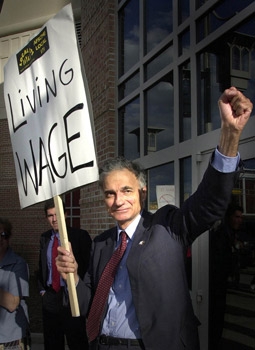
PR.com: Right now I’m reading Ron Paul’s book, The Revolution, and although he is a conservative, both of you have very similar ideas.
Ralph Nader: That’s happening more and more in Washington.
PR.com: Have you noticed that by any chance?
Ralph Nader: Oh yeah. I know Ron Paul. He introduced, at my request, the bill to legalize industrial hemp. It has five thousand uses and it’s not marijuana. It can be used for food, fuel, clothing and lubricants. It’s legal to import it from China, Romania, France and Canada but it’s illegal for our farmers to grow it.
PR.com: Do you have a non-interventionist philosophy, as it pertains to foreign policy, as Ron Paul does?
Ralph Nader: Yeah. But, when you see a Rwanda situation, we need a highly professional United Nations rescue operation and peacekeeper. But, generally speaking, you can’t occupy countries. They’ll fight you till the end. The longest occupied region in the world is Palestine. Have they stopped fighting? You cannot conquer Afghanistan. The British tried it decades ago, The Russians tried it, and we’re trying it. You cannot dominate these counties because it’s their homeland. They will fight and fight and fight. We’ve got other things to do to make our country a better place to live, for present and future generations.
PR.com: What do you say to people who feel that you only announce your candidacy for President to cause a ruckus, or perhaps because you want to sabotage a particular Democratic candidate?
Ralph Nader: I want to build Democracy. I want to engage more and more people in the electoral process. These two parties have been at it for a long time and they can’t get more than half of the people out to vote in a Presidential year. That’s pretty bad.
PR.com: Obviously you can’t win on principals, alone. As you’ve said, it has to do with power and marketing. So, if you’re being outspent by hundreds of millions of dollars, how can somebody like you ever hope to win a Presidential election?
Ralph Nader: Well, you build. You build and you galvanize and you keep it alive in all the ways that our website is showing. You push the two major candidates, called the “tugboat candidacy.” That’s what little parties did in the 1800s; the women’s right to vote, anti-slavery parties, the farmer labor parties. They all never won a national election, but they sure pushed the social justice issues further than if our ancestors had to wait for the two parties to do so. I think the two parties are likely to be broken up by multi-billionaires running, turning it into a three-way race. If Bloomberg ran early, he’d have turned it into a three-way race. Perot didn’t do badly either, 19 million [votes]. Those are the people who get the attention of the press because they’ve got zillions of dollars. Then they get the polls, because people know what they’re doing, what they’re saying. It’s a sad commentary. But, having said that, there are more than a few progressive multi-billionaires in the country who could turn it into a three-way race and start breaking up the two party elected dictatorship.
PR.com: Would you ever in a million years consider running on a Democratic ticket as a means to an end?
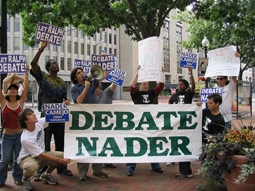
Ralph Nader: No, because they are a private corporation, Allison. They could keep me off the primary debates. They don’t have to put me on the debates at all. These are private corporate debates. They could even say that they’re not going to recognize me as a nominee, because I’m just doing it expediently after challenging them all these years. Then even if I was on, they would just marginalize [me]. Look what they did to Kucinich for heaven’s sake. He’s been a loyal Democrat for forty years (Ohio Congressman Dennis Kucinich ran in the early 2008 Democratic Primaries before withdrawing his candidacy on January 23, 2008.).
PR.com: What do you think was the best social policy ever put forth by a United States President?
Ralph Nader: There are some. The G.I. Bill of Rights under Roosevelt, the Homestead Act by Lincoln… Medicare was very important, and of course the Emancipation Act of 1863.
PR.com: Have you ever pursued private financial backing for your candidacy?
Ralph Nader: We just accept money from individuals, as long as it’s legal. We don’t take money from PACs (Political Action Committees). We don’t take money from commercial interests, which have a quid pro quo, like the oil companies, auto companies and insurance banks. We don’t do that. If people want to contribute, no matter who they are, Democrat, Liberal, Conservative, Republican, Green, whatever… you want to contribute? Welcome. There’s no quid pro quo (a Latin term meaning “something for something”). They see where we stand and they see our issues on the table. You want to contribute? We’re grateful.
PR.com: What’s been your proudest career achievement up until now?
Ralph Nader: Showing people they can make a difference and strengthening democratic initiatives for a more just and free society. Having said that, there are categories like safer autos, which saved a million lives or more in this country since 1966, and millions of injuries prevented. All these health and safety laws, Freedom of Information Law was very key in 1974, which we subsequently litigated and strengthened. But, basically it’s to show what individuals can do. If someone in Topeka or Atlanta or Kalamazoo sees us doing these things, maybe they’ll say, “Maybe we can do the same thing locally.” We’ve had a lot of evidence of that. We show people what the tools of democracy are, how to be a skilled citizen. How to use The Free Information Act, how to build a coalition, how to have a good news conference, how to be resilient and not get discouraged. I’ve started over 150 groups all over the country. Especially the student groups; they’ve given students the opportunity to train themselves into skilled civic action. The schools don’t provide courses in civic skills, by and large. So, they have to do it in the field, the field of reality.
PR.com: Have you ever made a social or political blunder, where you threw your hat into the ring and then realized that maybe you shouldn’t have?
Ralph Nader: You mean electoral blunder, or any blunder?
PR.com: Any blunder. Speaking out about a social or political issue, or speaking out against a political opponent.
Ralph Nader: I spoke out [incorrectly] against Lyndon Johnson appointing Betty Furness as his chief consumer advisor, because she had been a promoter of Westinghouse products on TV. I was completely wrong. She turned out to be terrific in all ways. But, we have to be very careful with our facts because the corporations pounce on them and exaggerate the errors, and try to damage our credibility.
PR.com: People see you as just this machine of social activism and they don’t know much else about you. What do you do in your downtime?
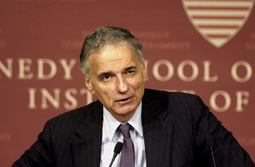
Ralph Nader: You think I have much down time (laughs)?! I don’t have much downtime. But, I read, I hike, I banter with reporters. I used to play baseball and basketball and chess, and all those things. There’s not enough hours in the day now. Our beloved country is being driven into the ground in so many ways.
PR.com: What are your thoughts on these mortgage executives, on the FAA scandal… on all of these cover ups just for dollars?
Ralph Nader: Law and order for the established powers that be, not for the people in the streets. We don’t have enough law enforcement up the scale of wealth and power. It doesn’t go up [there], and when it does it gets very thin. There are only 75 lawyers in the justice department’s environmental crimes division (as an example) to deal with all of the environmental crimes. One law firm! There are 1,500 lawyers representing corporate crooks.
PR.com: Do you think you’ll ever retire?
Ralph Nader: No. You see, the concept of retirement started with the industrial revolution; a forty hour week, and all that. Primitive tribes don’t have a sense of retirement. Why would anybody want to retire from doing things one loves to do?
Visit www.votenader.org to learn more about Ralph Nader’s ongoing consumer advocacy work and the 2008 Nader/Gonzalez Independent Presidential ticket.
